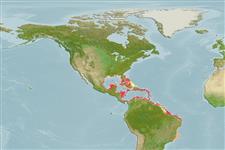>
Eupercaria/misc (Various families in series Eupercaria) >
Gerreidae (Mojarras)
Etymology: Gerres: Latin, gerres = a kind of anchovies; cited by Plinius.
More on author: Walbaum.
Environment: milieu / climate zone / depth range / distribution range
Οικολογία
Θαλασσινό(ά); Γλυκού νερού; Υφάλμυρο Υφαλόφιλο(α); αμφίδρομο (Ref. 51243); εύρος βάθους 1 - 15 m (Ref. 9710). Subtropical; 33°N - 23°S, 98°W - 34°W
Western Atlantic: Bermuda and Florida, USA; Bahamas, northern Gulf of Mexico, around Caribbean, including Antilles and south American coast (Ref. 26938) to Rio de Janeiro, Brazil.
Length at first maturity / Μέγεθος / Βάρος / Age
Maturity: Lm 20.0, range 19 - ? cm
Max length : 41.0 cm TL αρσενικό/απροσδιόριστο; (Ref. 7251); common length : 30.0 cm TL αρσενικό/απροσδιόριστο; (Ref. 6077); μεγ. δημοσιευμένο βάρος: 530.00 g (Ref. 40637)
Εδρικές άκανθες: 3; Μαλακές εδρικές ακτίνες: 7. Silvery with about seven faint pinkish bars on side on body; pelvic fins yellow (Ref. 13442).
Inhabits shallow coastal waters in open sandy and surf areas, seagrass beds, near reefs, and mangrove channels (Ref. 7251). Enters brackish water, sometimes even fresh water (Ref. 3722). May occur in small aggregations (Ref. 3722). Feeds on benthic invertebrates such as worms, clams, crustaceans (Ref. 3722); also feeds on insects (Ref. 9303). Often seen feeding in sand patches among reefs by thrusting its mouth into the sediment and expelling sand from the gill openings (Ref. 13442). Easily approached (Ref. 9710). Marketed fresh but not highly esteemed; also processed into fishmeal (Ref. 3722).
Life cycle and mating behavior
Maturities | Αναπαραγωγή | Spawnings | Egg(s) | Fecundities | Προνύμφες
Bussing, W.A., 1995. Gerreidae. Mojarras. p. 1114-1128. In W. Fischer, F. Krupp, W. Schneider, C. Sommer, K.E. Carpenter and V. Niem (eds.) Guia FAO para Identification de Especies para lo Fines de la Pesca. Pacifico Centro-Oriental. 3 Vols. FAO, Rome. (Ref. 9303)
IUCN Red List Status (Ref. 130435)
Threat to humans
Reports of ciguatera poisoning (Ref. 30911)
Human uses
αλιεία: περιορισμένης εμπορικότητας; δόλωμα: occasionally
Εργαλεία
Special reports
Download XML
Διαδικτυακές πηγές
Estimates based on models
Preferred temperature (Ref.
123201): 23.4 - 28.1, mean 27.3 °C (based on 792 cells).
Phylogenetic diversity index (Ref.
82804): PD
50 = 0.5000 [Uniqueness, from 0.5 = low to 2.0 = high].
Bayesian length-weight: a=0.01318 (0.01026 - 0.01693), b=3.05 (3.01 - 3.09), in cm total length, based on LWR estimates for this species (Ref.
93245).
Τροφικό Επίπεδο (Ref.
69278): 3.5 ±0.2 se; based on diet studies.
Ελαστικότητα (Ref.
120179): Μεσαίο(α), ελάχιστος χρόνος για διπλασιασμό πληθυσμού 1,4 - 4,4 έτη (K=0.60; tm=1.5).
Fishing Vulnerability (Ref.
59153): Low vulnerability (24 of 100).
Nutrients (Ref.
124155): Calcium = 38.3 [14.7, 84.5] mg/100g; Iron = 0.618 [0.273, 1.172] mg/100g; Protein = 20.5 [18.5, 22.5] %; Omega3 = 0.209 [0.106, 0.425] g/100g; Selenium = 12.5 [5.7, 26.9] μg/100g; VitaminA = 30.3 [7.2, 118.1] μg/100g; Zinc = 0.917 [0.561, 1.436] mg/100g (wet weight);
